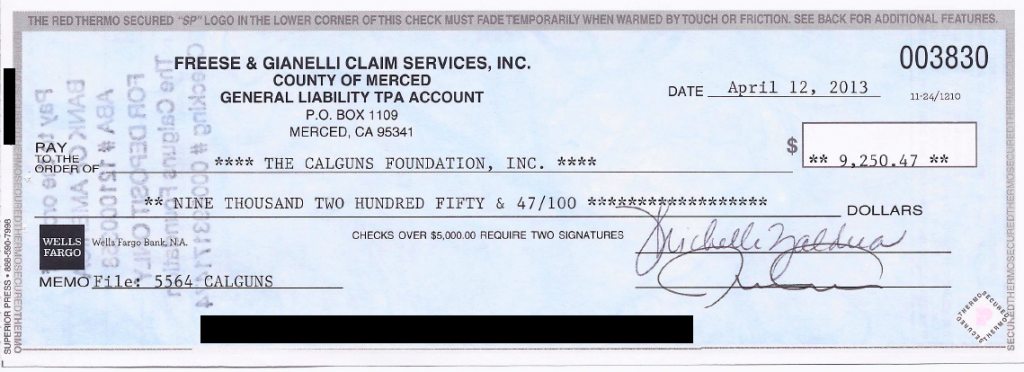After the City of Sunnyvale (California) passed Measure C which included among other things magazine bans, the CalGuns Foundation decided to do a little digging using California’s California Public Records Act. What they found out was quite interesting and just show hypocritical the city’s own policies and practices are when it comes to firearms and magazines. For example, residents of Sunnyvale aren’t allowed to possess magazines with greater than a 10 round capacity. However, police officers are required to have loaded 20 round magazines in their issue AR-15 along with two spares stored in the trunk of their police cruiser.
Another example is that the City of Sunnyvale’s Public Safety Department, Traffic Safety Unit has not one but two Heckler & Koch MP7 Personal Defense Weapons. You and I couldn’t own one of these even if we paid the $200 NFA tax stamp because of the Hughes Amendment. However, Sunnyvale considers these essentials weapons for a unit whose mission is “to ensure the safe and orderly flow of pedestrian, bicycle, and vehicular traffic.” Could someone in Sunnyvale please explain to me why a motorcycle cop needs a full auto sub-machine gun to stop jay walkers and to make sure bicyclists stay in the bike lanes?
Read CalGuns release below and make sure to scan through the documents that they obtained from the City of Sunnyvale. They make for interesting reading.
ROSEVILLE, CA — In response to the City of Sunnyvale’s recently-passed (and now infamous) Measure C – sweeping new and unconstitutional gun control laws that directly [negatively] affect law-abiding people — The Calguns Foundation (CGF) sought out public records to better understand the City’s own policies and practices as they relate to firearm/magazine acquisition and possession for its employees and contractors.
Measure C passed on November 5, 2013, in a low-turnout election and took effect Dec. 6, giving gun owners until March 6 to comply with the new regulations, including an outright ban on the possession of “large-capacity” magazines holding more than 10 rounds — even those ‘grandfathered’ under state law. A number of firearms organizations have subsequently announced legal actions against the City to block the law from being enforced and, in at least one case, have it judicially declared as unconstitutional.
On October 29, 2013, CGF executive director Brandon Combs sent this request for information under the California Public Records Act. Our request consisted of the following 6 classifications of public records:
1. Public notices, bid documents (including specifications), contracts, purchase orders, payments, and other such records reflecting expenditures by the City for the acquisition of firearms, including makes, models, and quantities;
2. Public notices, bid documents (including specifications), contracts, purchase orders, payments, and other such records reflecting expenditures by the City for the acquisition of firearm accessories and firearm parts, including makes, models, and quantities;
3. Public notices, bid documents (including specifications), contracts, purchase orders, payments, and other such records reflecting expenditures by the City for firearm repair and/or modification, including records going to the type of repair(s)/modification(s) and its/their cause(s);
4. Policies, manuals, guides, and other such governing documents addressing the City’s requirements/standards/rules for firearms, firearms accessories, and firearms parts used for City business, including but not limited to law enforcement, whether owned by the City or not;
5. Policies, manuals, guides, and other such governing documents addressing the City’s rules for personal acquisition of firearms, firearm accessories, and/or firearm parts by its employees and contractors; and
6. City authorizations or records addressing personal acquisition of firearms, firearm accessories, and/or firearm parts by City employees or contractors.
On November 20, 2013, the City replied to our request and sent these responsive documents, some 97 pages of policies and purchase orders. In its own records, the Sunnyvale acknowledged several key arguments relating to effective self-defense and implicitly concedes that we are correct about common semi-automatic firearms and their necessary components, like magazines. For example:
Unloaded firearms are useless and not tactically-appropriate for self-defense;
Modern semi-automatic firearms provide significant upside to those who are forced to use them for self-defense; and
Magazines having a capacity greater than ten (10) rounds — “large-capacity” in government elitist-speak — offer such material benefit that they are specified for City employees and provided to them at taxpayer expense.
The City records we acquired as part of our audit will continue to be scrutinized by us, by you, and, hopefully, the news media.

